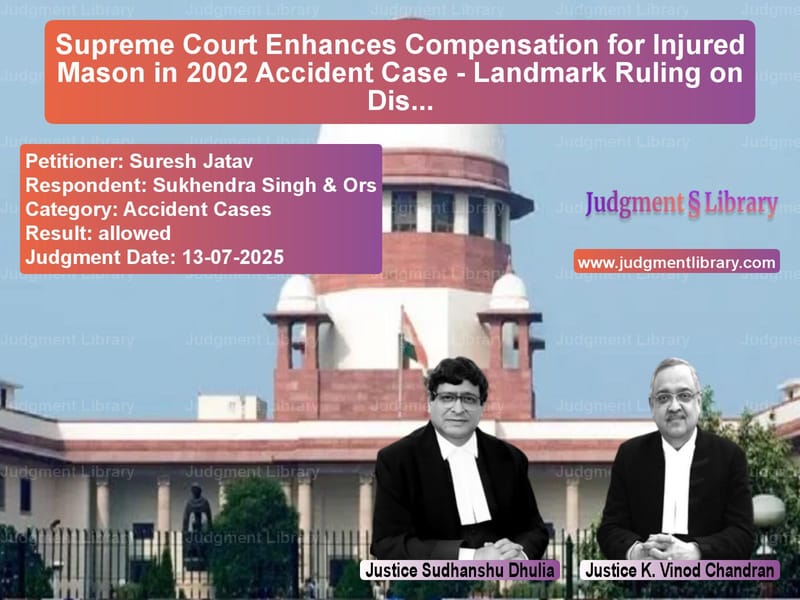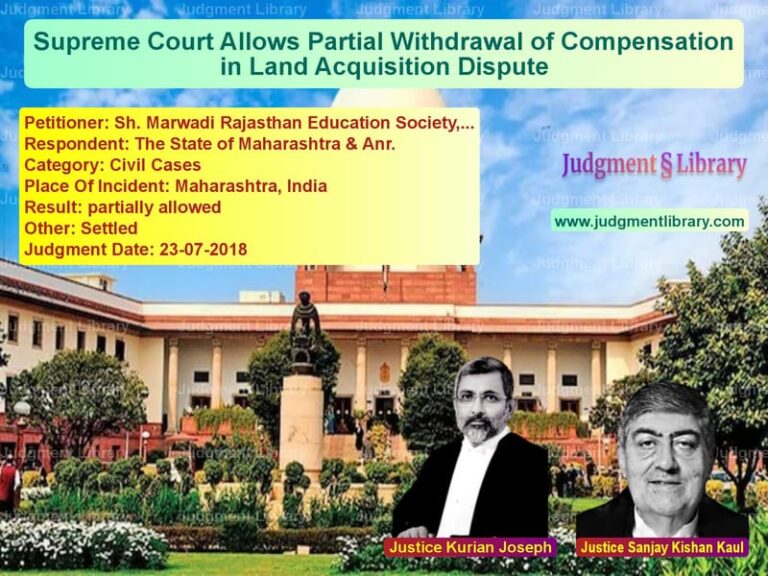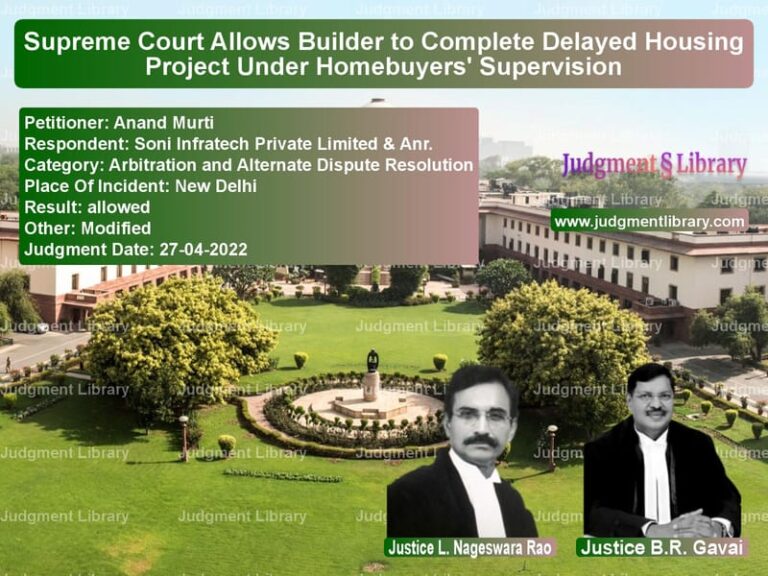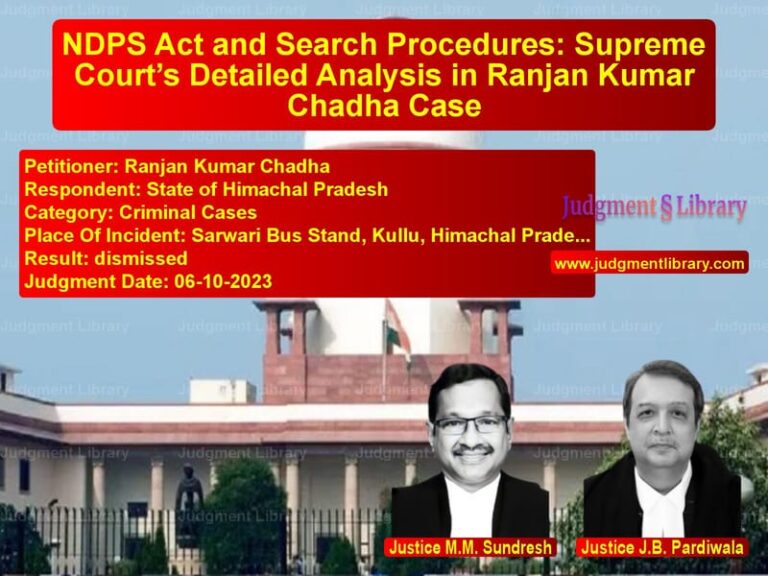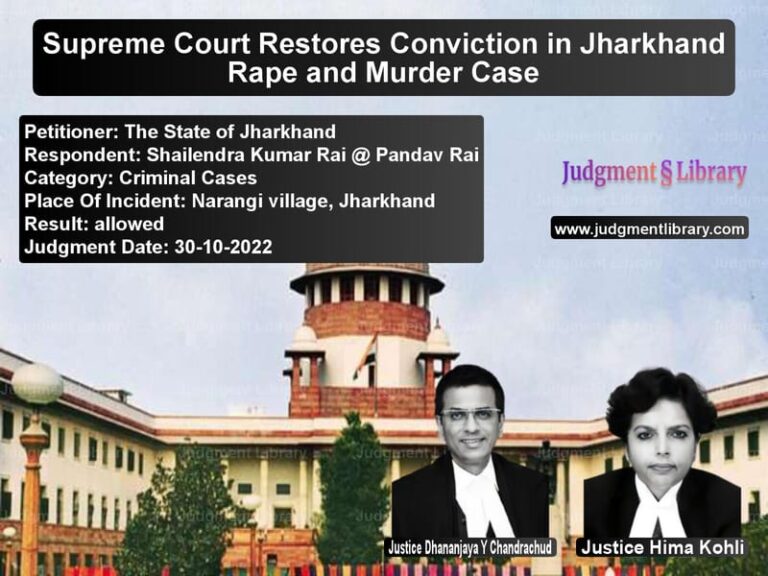Supreme Court Enhances Compensation for Injured Mason in 2002 Accident Case – Landmark Ruling on Disability Assessment
In a significant ruling that brings justice to an accident victim after a long legal battle spanning over two decades, the Supreme Court of India has substantially enhanced the compensation awarded to a skilled mason who suffered severe injuries in a 2002 road accident. The judgment, delivered on July 14, 2025, marks an important interpretation of disability assessment principles and income calculation for compensation claims.
The case involved Suresh Jatav, a skilled mason whose life took a dramatic turn on August 12, 2002, when he was travelling in an auto rickshaw that collided with a rashly driven bus. The accident left him with multiple serious injuries that required extensive medical treatment and permanently affected his ability to work in his chosen profession.
The appellant was hospitalized for about six days and had to undergo surgery for the compound fracture suffered on the fibula of his right leg. He also suffered a fracture to the ulna of the right hand which required plastering. The medical records indicated that the appellant had been regularly visiting the hospital due to his leg having not healed properly, indicating the severity and lasting impact of his injuries.
Before the Motor Accident Claims Tribunal, the appellant claimed that he was a skilled mason and examined a person working with him to prove that he was earning an income of Rs.200 per day. The medical treatment undergone by him and the disability was proved by examination of the record clerk of the hospital who produced the necessary records and the doctor who treated the appellant.
However, the Tribunal took a conservative approach in assessing compensation. Despite the appellant claiming Rs.6,000 per month as income, the Tribunal adopted only Rs.3,000 as monthly income. On the crucial aspect of disability assessment, while the medical certificate showed 35% disability, the Tribunal reduced it to 25% on the reasoning that the certificate was only with respect to the right leg and hence, the whole-body disability could only be 25%. The Tribunal awarded a total compensation of Rs.1,62,000, which the appellant found inadequate given the permanent impact on his livelihood.
The matter was then taken to the High Court, which provided some relief but still fell short of adequately compensating the victim. The High Court increased the income to Rs.3,500 and made a 40% addition for future prospects. It also awarded Rs.25,000 for future treatment and increased the amounts for special diet to Rs.12,000 while retaining the medical expenses at Rs.10,000. For pain and suffering, the High Court enhanced it to Rs.30,000 and granted Rs.12,000 as attendant charges for six months at the rate of Rs.2,000 per month. Since the appellant, as per medical records, would have been laid up for about six months, the High Court also granted an additional amount of Rs.10,000 for transportation charges and Rs.21,000 for loss of income.
Dissatisfied with what he considered inadequate compensation, Suresh Jatav approached the Supreme Court, setting the stage for a crucial examination of compensation principles in motor accident claims.
The Supreme Court, in its landmark judgment, made significant enhancements to the compensation, particularly on two crucial aspects: income assessment and disability evaluation.
On the question of income assessment, the Court made a crucial observation that became the foundation for its enhanced compensation. The Court referred to its earlier precedent in Ramachandrappa v. Manager, Royal Sundaram Alliance Insurance Company, where it had found that a coolie would get an amount of Rs.4,500 as his monthly income in the year 2004. The Court reasoned that “definitely, an incremental increase of an unskilled worker’s income can be assessed at Rs.500 per year in which context, even an unskilled worker would earn an income of Rs.10,000 in the year 2008.” Based on this reasoning, the Court held that “the income as claimed by the appellant, a skilled mason can be accepted” at Rs.6,000 per month.
The second crucial aspect where the Supreme Court differed from the lower courts was in the assessment of disability. The Tribunal had reduced the disability from 35% to 25% on mere conjectures, which the Supreme Court found unacceptable. The Court emphasized that “there should be valid reasoning to go behind the opinion of an expert, especially in the matter of assessment of disability.”
The Court noted that “the doctor who was examined before the Tribunal had specifically deposed that the appellant was unable to sit down and walk and could not lift heavy weights. He was also said to be in constant pain.” Considering the entire circumstances and also since the Court had accepted that the claimant was a skilled mason, his disability was assessed at 35%. The Court significantly observed that “the evidence of the doctor would indicate that he could not have continued his chosen vocation,” highlighting the functional impact of the disability on the appellant’s livelihood.
Based on these findings, the Supreme Court recalculated the compensation under various heads. For compensation for permanent disability, the Court awarded Rs.5,64,480 calculated as Rs.6,000 x 12 x 140% x 16 x 35%. The Court retained the amount of Rs.25,000 for future treatment and Rs.12,000 for special diet for six months as awarded by the High Court.
For loss of income for six months, since the Court had adopted a higher income of Rs.6,000, it necessarily had to be Rs.36,000 for six months. The medical expenses were increased to Rs.20,000 considering that the appellant suffered two fractures, one of which was a compound fracture requiring surgical intervention. For pain and suffering, considering the continued partial disability, the amount was increased to Rs.50,000. The attendant expenses were maintained at Rs.12,000 as awarded by the High Court.
The total compensation awarded by the Supreme Court amounted to Rs.7,19,480, a substantial enhancement from the Rs.1,62,000 awarded by the Tribunal and significantly higher than what the High Court had granted.
The Court directed that “the above-mentioned amounts shall be paid, after deducting the amount which has already been paid with interest as directed by the Tribunal, running from the date of filing the claim petition, within a period of two months.” The appellant was directed to provide his account details to which the money shall be deposited online by the insurance company within the stipulated period.
This judgment is significant for several reasons. First, it establishes a clear principle for income assessment of skilled workers in compensation cases, recognizing that their earning capacity is substantially higher than unskilled laborers. Second, it reinforces the importance of expert medical opinion in disability assessment and cautions against arbitrary reduction of disability percentages without valid reasoning. Third, it acknowledges the functional impact of disabilities on specific professions, particularly manual occupations where physical capability is crucial for livelihood.
The Court’s approach in this case demonstrates a victim-centric interpretation of compensation laws, ensuring that accident victims are adequately compensated not just for their immediate medical expenses and suffering, but also for the long-term impact on their earning capacity and quality of life.
The ruling also highlights the importance of proper assessment of future prospects, especially for skilled workers who have the potential for income growth over time. By accepting the appellant’s claimed income and applying appropriate multipliers, the Court ensured that the compensation reflected the true economic loss suffered by the victim.
This judgment serves as an important precedent for similar cases where victims from skilled professions suffer disabilities that affect their ability to continue in their chosen vocations. It emphasizes that compensation should not be merely symbolic but should genuinely reflect the economic and non-economic losses suffered by accident victims.
The Supreme Court’s intervention in this case after more than two decades since the accident occurred also underscores the need for expeditious disposal of compensation claims, as delays often compound the suffering of victims who are struggling with both physical injuries and financial hardships.
In conclusion, the Supreme Court’s judgment in Suresh Jatav’s case represents a significant step forward in ensuring adequate compensation for accident victims, particularly those from skilled professions whose livelihoods depend on their physical capabilities. The Court’s reasoned approach to income assessment and disability evaluation sets important benchmarks for lower courts and tribunals to follow in similar cases, ensuring that justice is not just done but is seen to be done for those who suffer due to negligence on our roads.
Petitioner Name: Suresh Jatav.Respondent Name: Sukhendra Singh & Ors.Judgment By: Justice Sudhanshu Dhulia, Justice K. Vinod Chandran.Judgment Date: 13-07-2025.Result: allowed.
Don’t miss out on the full details! Download the complete judgment in PDF format below and gain valuable insights instantly!
Download Judgment: suresh-jatav-vs-sukhendra-singh-&-or-supreme-court-of-india-judgment-dated-13-07-2025.pdf
Directly Download Judgment: Directly download this Judgment
See all petitions in Road Accident Cases
See all petitions in Compensation Disputes
See all petitions in Motor Vehicle Act
See all petitions in Negligence Claims
See all petitions in Damages and Compensation
See all petitions in Judgment by Sudhanshu Dhulia
See all petitions in Judgment by K. Vinod Chandran
See all petitions in allowed
See all petitions in supreme court of India judgments July 2025
See all petitions in 2025 judgments
See all posts in Accident Cases Category
See all allowed petitions in Accident Cases Category
See all Dismissed petitions in Accident Cases Category
See all partially allowed petitions in Accident Cases Category

